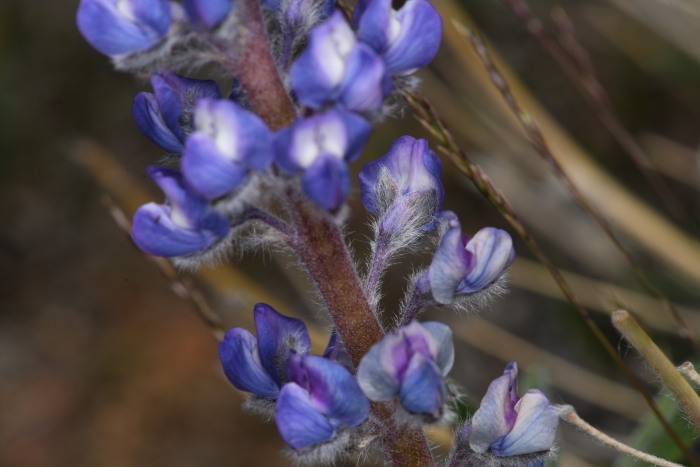Nevada Lupine
(Lupinus nevadensis)
Nevada Lupine (Lupinus nevadensis)
/
/

© Chloe and Trevor Van Loon
CC BY 4.0
Image By:
© Chloe and Trevor Van Loon
Recorded By:
Copyright:
CC BY 4.0
Copyright Notice:
Photo by: © Chloe and Trevor Van Loon | License Type: CC BY 4.0 | License URL: http://creativecommons.org/licenses/by/4.0/ | Uploader: chloe_and_trevor | Publisher: iNaturalist |














Estimated Native Range
Summary
Lupinus nevadensis, commonly known as Nevada lupine, is a perennial herb that is native to the western Great Basin in Nevada, as well as adjacent areas of Oregon and California. It thrives in sagebrush steppe ecosystems, often found in well-drained soils of valleys and slopes. This species typically grows to a height of 4 to 16 inches tall and is characterized by its palmate leaves with 6 to 10 hairy leaflets, each up to 2 inches long. The stems are coated in long hairs, adding to the plant’s textured appearance. The inflorescence is a striking spiral of blue flowers, each with a whitish patch on the banner and a curved keel, which are quite showy despite their small size. The fruit is a very hairy legume pod that can grow up to 2 inches long.
Nevada lupine is appreciated for its ornamental blue flowers that bloom in the spring and early summer, adding color to rock gardens, native plant landscapes, and wildflower meadows. It is relatively low maintenance, requiring minimal water once established, and prefers full sun to light shade conditions. The plant is well-suited to sandy or loamy soils with good drainage. While not commonly used in urban settings, it can be a valuable addition to restoration projects and xeriscaping due to its drought tolerance. Potential problems include susceptibility to root rot in poorly drained soils and damage from slugs and snails.CC BY-SA 4.0
Nevada lupine is appreciated for its ornamental blue flowers that bloom in the spring and early summer, adding color to rock gardens, native plant landscapes, and wildflower meadows. It is relatively low maintenance, requiring minimal water once established, and prefers full sun to light shade conditions. The plant is well-suited to sandy or loamy soils with good drainage. While not commonly used in urban settings, it can be a valuable addition to restoration projects and xeriscaping due to its drought tolerance. Potential problems include susceptibility to root rot in poorly drained soils and damage from slugs and snails.CC BY-SA 4.0
Plant Description
- Plant Type: Herb
- Height: 1-2 feet
- Width: 1-1.5 feet
- Growth Rate: Slow
- Flower Color: Blue, White, Yellow
- Flowering Season: Spring, Summer
- Leaf Retention: Deciduous
Growth Requirements
- Sun: Full Sun, Part Shade
- Water: Medium
- Drainage: Fast, Medium
Common Uses
Bee Garden, Butterfly Garden, Low Maintenance
Natural Habitat
Native to sagebrush steppe ecosystems in the western Great Basin
Other Names
Common Names: Sierra Lupine
Scientific Names: , Lupinus nevadensis, Lupinus indutus, Lupinus indutus,
GBIF Accepted Name: